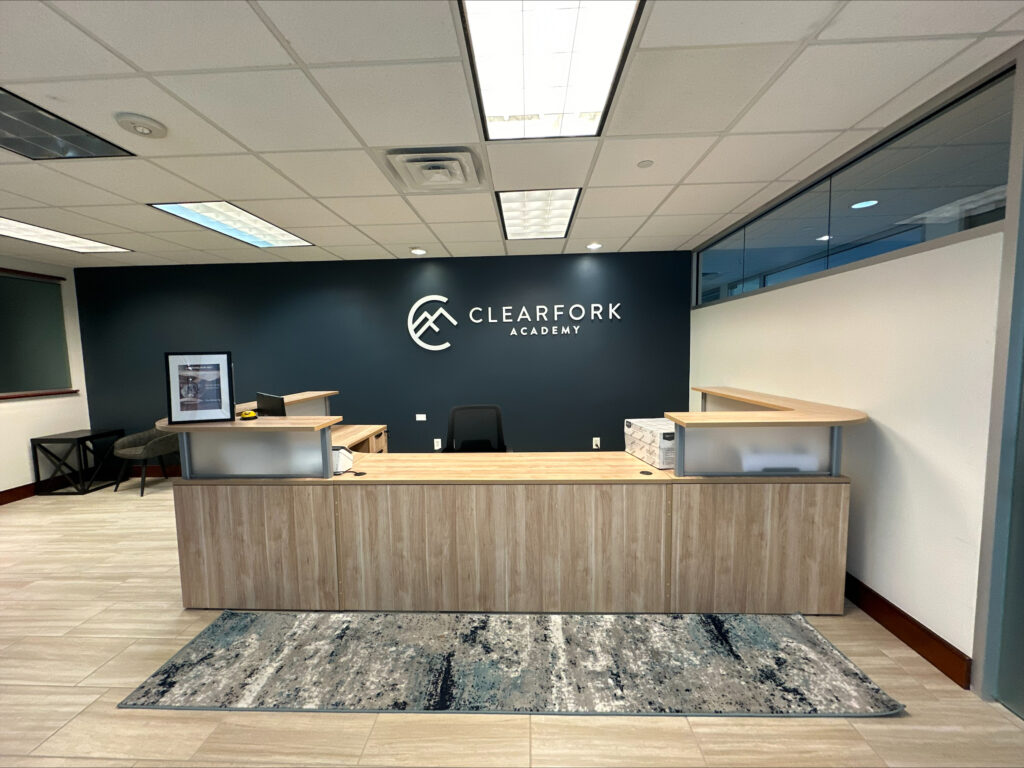Table of Contents
- A Crisis On Our Hands
- Understanding Intensive Outpatient Programs (IOPs)
- The Popularity of IOP Among Fort Worth Teens
- Benefits of Intensive Outpatient Programs
- Challenges of Intensive Outpatient Programs
- Selection Criteria to Look For in IOPs in the Fort Worth Area
- The Positive Impact of IOPs on Fort Worth Teens
- What to Expect from Clearfork’s IOP in Fort Worth

A Crisis On Our Hands
Substance abuse among teenagers is a critical issue that can deeply affect families, especially in areas like Fort Worth, TX, where access to various substances may be relatively easy.
A recent report noted a one-year ~1,566.66% increase in fentanyl doses seized by Federal agents in Dallas-Fort Worth and surrounding counties.
The Texoma High-Intensity Drug Trafficking Area (HIDTA) is one of 33 regions classified by the Office of National Drug Control Policy (ONDCP) as a regional distribution center for illegal drugs.
This year, the HIDTA directors named fentanyl the most significant drug threat in the 17 counties that form the Texoma HIDTA, beating heroin, cocaine, and methamphetamine.
Recently declassified government information related to doses of drug seized indicates the Dallas-Fort Worth Metropolitan Area and surrounding counties saw an approximate fifteen-fold increase in fentanyl doses seized between 2020 and 2021 alone, from ~12,000,0000 doses to ~200,000,000 doses.
The latter and most recent figure represents enough synthetic opioids to overdose or kill every man, woman, and child in the Lone Star State six times.

Understanding Intensive Outpatient Programs (IOPs)
For parents and guardians of teens with substance abuse issues, Intensive Outpatient Programs (IOPs) offer a balanced approach to recovery while allowing their teens to continue living at home and maintaining their daily routines.
Intensive Outpatient Programs are structured treatment programs designed to address addictions, eating disorders, and other dependency issues without requiring patients to stay in a hospital setting overnight.
IOPs are tailored to help individuals who do not require medical detoxification or round-the-clock supervision. Intensive outpatient programs allow teens to live at home outside of treatment hours.
This model of care is especially suitable for teens, as it allows them to receive comprehensive treatment while remaining integrated within their community and support networks.

The Popularity of IOP Among Fort Worth Teens
In Fort Worth, Texas, there are over two dozen Intensive Outpatient Programs (IOPs) in response to the growing need for flexible yet effective treatment options for substance abuse. The uptick in popularity can be attributed to several key factors that resonate with the lifestyle and the unique challenges faced by teenagers today.
Key Factors Behind the Trend
Cultural Shift Toward Mental Health: There’s a cultural shift toward acknowledging mental health struggles. IOPs address this by providing holistic care that includes mental health treatment, resonating with teens who seek a comprehensive approach.
Desire for Normalcy: Teens grappling with substance issues still yearn for a semblance of normalcy. IOPs allow them to maintain their daily routines, attend school, and be with their families, which is less disruptive than inpatient programs.
Community Support: The strong community aspect of IOPs, where teens can connect with peers facing similar struggles, has made these programs particularly attractive. This shared experience fosters a supportive network, crucial for long-term recovery.
Local Success Stories
Fort Worth has seen its share of success stories. One notable example is a local high school student who, after struggling with meth dependency, entered our residential treatment and completed every stage of the program. He then used our IOP to transition properly back to society and is now living a responsible adult life.
The program’s flexible schedule allowed him to continue his studies while receiving treatment, and the group sessions gave him a platform to rebuild his confidence and develop healthy coping mechanisms. His journey to recovery has inspired other teens to seek help.

Benefits of Intensive Outpatient Programs
IOPs offer a level of flexibility that is particularly beneficial for young individuals. Teens can attend school, manage part-time jobs, and participate in family life while also engaging in their recovery process. The benefits of such programs include:
Balance and Flexibility: IOPs typically require 10 to 12 hours a week in a treatment facility. This schedule allows teens to fulfill academic, familial, and social obligations alongside their recovery.
Family Involvement: Families play a crucial role in the recovery process. IOPs often include family therapy sessions, which help improve communication, rebuild relationships, and address any dysfunction within the home environment.
Peer Support: Group therapy is a cornerstone of IOPs, offering teens the chance to meet others facing similar challenges. This peer support is crucial for building empathy, understanding, and a sense of community.
Enhanced Social and Communication Skills: IOPs offer a unique environment where teens can enhance their social and communication skills. Through group therapy sessions and peer interactions within the program, teens learn to express themselves more effectively, listen actively, and empathize with others’ experiences.
These settings encourage openness and honesty, enabling participants to practice and refine interpersonal skills in a safe space. As a result, teens develop stronger relationships and a better understanding of social dynamics, equipping them with the tools needed for healthier interactions in their daily lives.
Continued Education and Growth: Educational sessions on coping strategies, stress management, and the impact of substance abuse on health are integral to IOPs, equipping teens with the knowledge to make better choices.
Access to Professional Help: Regular sessions with therapists and counselors provide continuous support, allowing for adjustments in treatment as needed and helping teens navigate the complexities of recovery.
Improved Academic Performance
Many teens benefit significantly from improved academic performance from enrolment in Intensive Outpatient Programs (IOPs). IOPs provide structured therapy while allowing teens to remain integrated into their academic settings, which can lead to several positive outcomes.
Firstly, the routine nature of IOPs helps teens establish regular study habits and improve time management skills. As they balance treatment with schoolwork, they often develop greater discipline and focus, key components of academic success.
IOPs also offer coping strategies for stress and anxiety, which can directly impact a student’s ability to perform well in school.
Another factor is the emphasis on personal responsibility and goal-setting that IOPs encourage. Teens learn to set realistic academic goals and work steadily towards achieving them, often with the support of program counselors.
And the peer support found in IOPs can translate into an informal study support system. Teens share not just their challenges but also academic tips and encouragement, fostering an environment where success in treatment and school is mutually reinforcing.
Local Fort Worth schools have reported better attendance and grades among students participating in IOPs, illustrating that when teens receive the support they need for their substance abuse issues, they are better equipped to meet the demands of their academic pursuits.
This holistic approach to recovery and personal development is at the heart of the success seen in academic improvements for IOP-enrolled teens.

Challenges of Intensive Outpatient Programs
While IOPs offer significant opportunities for healing and growth, there are challenges that parents and guardians must be aware of:
Consistency and Commitment: The success of an IOP hinges on the teen’s commitment to the program. Regular attendance and participation are critical, and without them, the effectiveness of treatment can be compromised.
Environmental Stressors: Since IOPs allow teens to live at home, they are continually exposed to the same environment where substance abuse may have begun. This can pose a risk for relapse, particularly if there are unresolved triggers within the home or community.
Personal Responsibility: Teens must take personal responsibility for their recovery. This can be daunting, especially for those who are not fully ready to embrace sobriety or who struggle with self-discipline.
Insurance and Costs: Not all IOPs are covered by insurance, and the costs can be a barrier for some families. However, many programs offer sliding scale fees or payment plans to help mitigate this challenge.
Do not let these challenges discourage you from exploring IOP as the preferred treatment for your son our daughter. Here are some signs that could indicate compatibility between your child and this form of treatment.

Selection Criteria to Look For in IOPs in the Fort Worth Area
When selecting an Intensive Outpatient Program (IOP) for a teen, several critical criteria should be considered to ensure the program is a good fit and can provide the best chance for recovery and personal growth.
Accreditation and Evidence-Based Practices: Ensure the IOP is accredited by a recognized body, such as The Joint Commission. This ensures the program meets certain standards of care. It should also employ evidence-based practices, including cognitive-behavioral therapy, which have been proven effective for substance abuse treatment.
Qualified Staff: The program should have licensed professionals with experience in adolescent psychology and substance abuse. A multidisciplinary team approach, including counselors, psychologists, and psychiatrists, can provide comprehensive care.
Family Involvement: Look for programs that offer family therapy or involve the family in the treatment process. Family participation is crucial for the teen’s recovery, as it can help repair and strengthen family dynamics.
Aftercare Planning: A good IOP will have a solid aftercare plan to support the teen post-treatment. Continuity of care is important for sustained recovery.
Specialized Programs for Teens: The IOP should cater specifically to teens, recognizing their unique developmental needs and social pressures.
Flexible Scheduling: To accommodate school and family commitments, the program should offer flexible scheduling.
Peer Group: Ensure that the program groups teens with peers facing similar issues, as this can enhance the treatment’s effectiveness through shared experiences.
Location and Accessibility: The facility should be easily accessible to reduce the burden of travel on the family and increase the likelihood of consistent attendance.
Careful consideration of these factors will help in choosing an IOP such as Clearfork Academy that not only addresses substance abuse issues but also supports the overall well-being and development of the teen.

The Positive Impact of IOPs on Fort Worth Teens
The impact on Fort Worth teens is significant. Through IOPs, teens have reclaimed their lives from the clutches of substance abuse. They’ve improved academically, restored relationships with their families, and developed strong ties within their peer groups.
This positive ripple effect strengthens not just the individuals but also the community at large, as each success story paves the way for a healthier, more vibrant Fort Worth.
Intensive Outpatient Programs represent a powerful tool in the fight against teen substance abuse, providing a structured yet flexible approach to recovery. The journey is not without its challenges, and the commitment required can be substantial.
Yet, with the right program and support network, IOPs can offer teens and their families the hope and help needed to overcome substance abuse and move forward toward a healthier, brighter future.
For parents and guardians, being informed, involved, and supportive can make a significant difference in the efficacy of these programs.
Remember, recovery is a marathon, not a sprint, and with patience, understanding, and the right resources, your teen can navigate the path to sobriety with resilience and determination.

What to Expect from Clearfork’s IOP in Fort Worth
Clearfork Academy has just opened a new IOP at 3880 Hulen St., Suite 420, Fort Worth, Texas. This IOP program can serve as a step-down process after completion of a Partial Hospitalization Program (PHP) and includes three hours of group therapy, individual therapy, and family therapy as clinically appropriate.
This IOP program focuses on your teen’s emotional growth and coping skills development. Outpatient treatment programs like ours at Clearfork Academy particularly help young people with certain mood disorders or who are in the early stages of substance abuse or addiction.
With an approach rooted in faith, family, and community, Clearfork Academy provides a nurturing environment where teens can discover their potential and embark on a journey toward lasting recovery
Our Program
Our program is structured as follows:
- Monday-Friday 9 am – 3 pm for school year
- Monday-Friday 9 am -12 pm for school breaks
- 9 am – 12 pm – group, 12 pm – 3 pm – school
We offer additional programs as follows:
- Bi-weekly individual session
- Weekly medication management visits
- Weekly follow-ups with family
Other information:
- Estimate of 5-7 weeks long
- Must attend every day
- Free to and from rideshare transportation
- We work with your child’s home district to ensure work is completed
- Admissions after discharge from Clearfork RTC, arrive the following business day at 8:45 am with Lunch that does not need to be kept cold
- Books/technology for school
We even offer the option for teens to attend therapy sessions virtually!


Originally from the Saginaw, Eagle Mountain area, Austin Davis earned a Bachelor of Science in Pastoral Ministry from Lee University in Cleveland, TN and a Master of Arts in Counseling from The Church of God Theological Seminary. He then went on to become a Licensed Professional Counselor-Supervisor in the State of Texas.
Austin’s professional history includes both local church ministry and clinical counseling. At a young age, he began serving youth at the local church in various capacities which led to clinical training and education. Austin gained a vast knowledge of mental health disorders while working in state and public mental health hospitals. This is where he was exposed to almost every type of diagnosis and carries this experience into the daily treatment.
Austin’s longtime passion is Clearfork Academy, a christ-centered residential facility focused on mental health and substance abuse. He finds joy and fulfillment working with “difficult” clients that challenge his heart and clinical skill set. It is his hope and desire that each resident that passes through Clearfork Academy will be one step closer to their created design.
Austin’s greatest pleasures in life are being a husband to his wife, and a father to his growing children. He serves at his local church by playing guitar, speaking and helping with tech arts. Austin also enjoys being physically active, reading, woodworking, and music.




